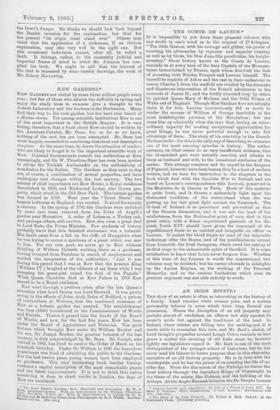THE COMTE DE LAUZUN.*
Jr is impossible to put down these pleasant volumes with any doubt in one's mind as to the original of D'Artagnan. "The little Gascon, with his courage and glitter, his power of worsting his adversaries by repartee and superior cunning as well as by blows, his Don Juan-like proclivities, his knight- errantry," whom history knows as the Comte de Lauzun, reminds us at every turn of the fiery Captain of the Mousque- taires immortalised by Dumas, upon whom devolved the task of arresting both Nicolas Fouquet and Lauzun himself. The incredible exploits of Athos and the rest in their endeavour to rescue Charles I. from the scaffold are rivalled by the dramatic and disastrous intervention of the French adventurer in the counsels of James II., and the boldly executed coup by which he spirited Queen Mary of Modena and the little Prince of Wales out of England. Though Miss Sandars does not actually claim it for him, Lauzun unconsciously did as much to render the success of William of Orange inevitable as the most indefatigable partisan of the Revolution; but she sums him up admirably when she says that, having an extra- ordinary capacity for making exceptional opportunities for great things, he was never powerful enough to take full advantage of them. The story of his courtship by the Grande Mademoiselle—for this is the only way of describing it—remains one of the most amazing episodes in history. The author assumes, on what seems to us very insufficient evidence, that the ill-matched pair were actually married, and alludes to them as husband and wife, to the occasional confusion of the reader. This strange romance, and its sequel in the dungeon of Pignerol, however, have been beaten thin by a host of modern writers, and we turn for instruction to the chapters in the hook which deal with the Jacobite War in Ireland, and are based on Lauzun's correspondence with Louvois, preserved in the Ministere de la Guerra in Paris. Much of this material is quite fresh, and it throws a melancholy light upon the distracted condition of the sister-island when she was putting up her last great fight against the &Eisenach. The ill-luck of Ireland is as persistent and proverbial us that of the Stuarts themselves, and it was not the least of her misfortunes, from the Nationalist point of view, that in this groat crisis, with a dozen experienced generals at his dis- posal, Louis XIV. should have given the commend of the expeditionary force to so untried and incapable an officer as Lauzun. It makes the blood tingle to read of the miserable bickerings after the Boyne, and of his pusillanimous retreat from Limerick, the Irish Saragossa, which owed the raising of its first siege to the indomitable spirit of Sarsfield. It is some satisfaction to know that Louis never forgave him. Whether at this time of day Lauzun is worth the conventional two volumes may be doubted; but his career abounds in sidelights on the Amin. Regime, on the working of the Personal Monarchy, and on the curious limitations which even its greatest exponent was not able entirely to evade.









































 Previous page
Previous page